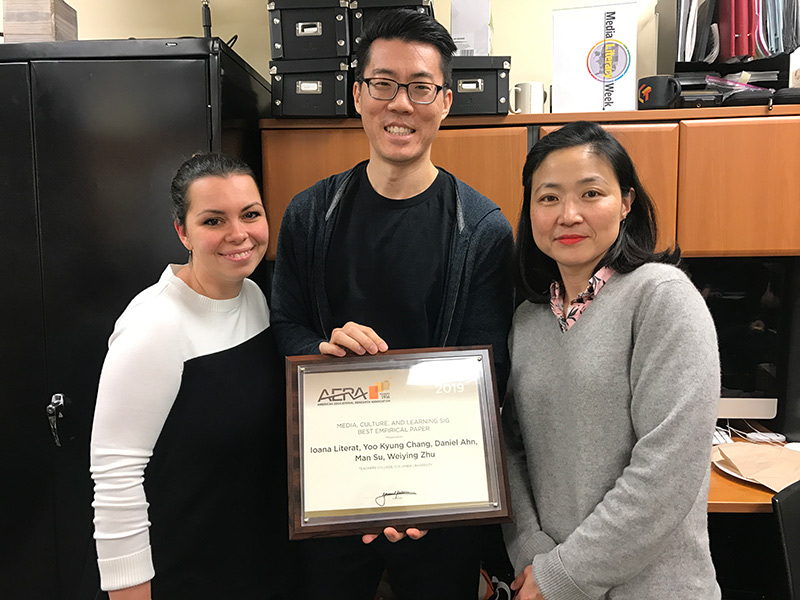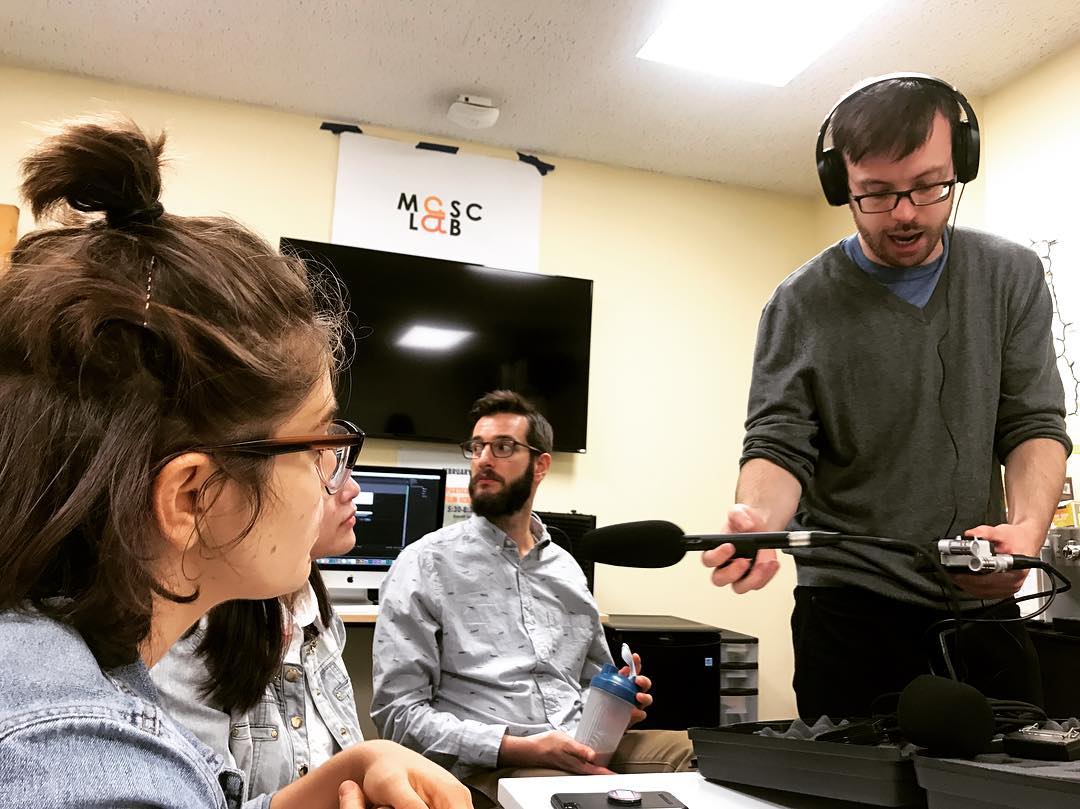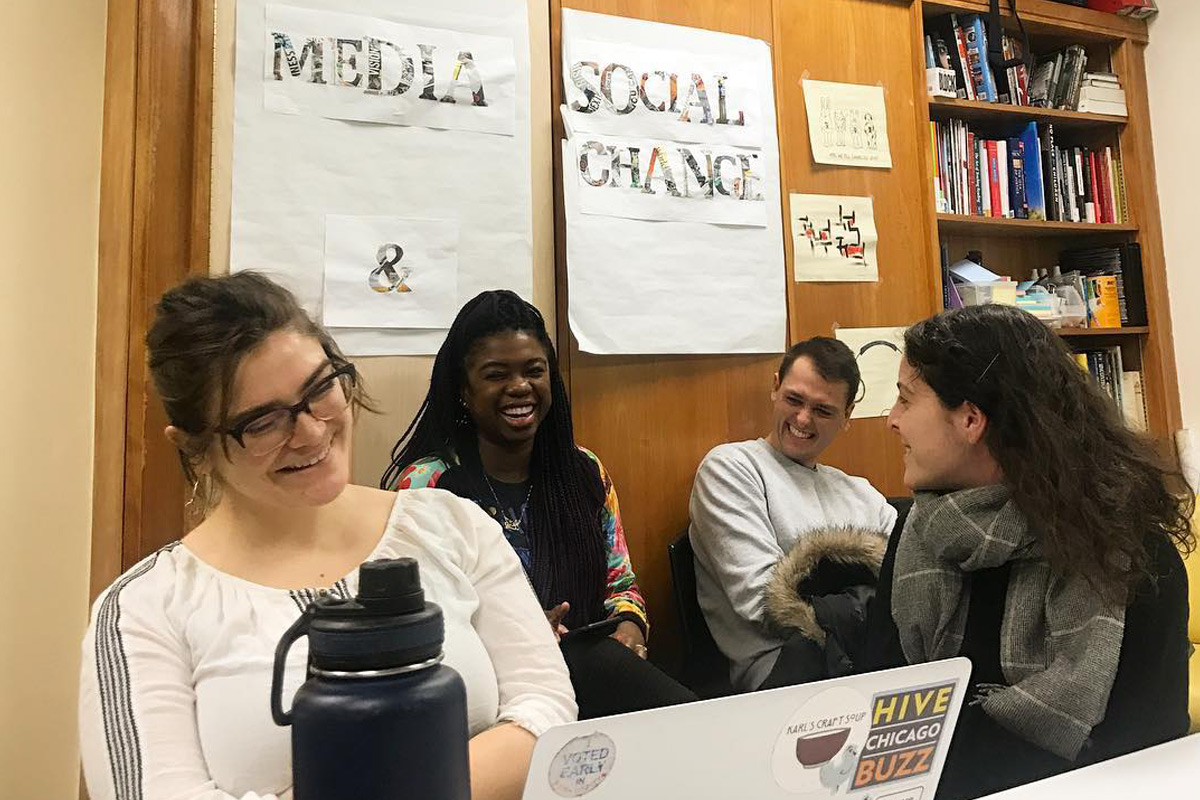Last month’s special citation for “Best Empirical Paper” from the American Educational Research Association’s Media, Culture & Learning Special Interest Group did more than simply honor a TC team’s research on using technology to make kids more media-savvy and civically engaged.
Recognition of the paper – “Gamifying Fake News: Playful Approaches to News Literacy Education for Middle School Students,” by faculty members Ioana Literat and Yoo Kyung Chang, and master’s degree students Daniel Ahn, Man Su and Weiying Zhu – also spotlighted the space in which it was conceived: TC’s Media and Social Change Lab (MASCLab).
Founded five years ago by Lalitha Vasudevan, Professor of Technology & Education (and now with added leadership from Literat, Assistant Professor of Communication, Media & Learning Technologies), MASCLab is guided by the philosophy that students should become producers of culture. One of the College’s most popular intellectual gathering points — even though it currently offers no academic credits — MASCLab, first and foremost, encourages students from all departments to tell stories on evolving digital platforms. This goal is accomplished through engaged research, pedagogical outreach events (such as interactive media screenings), and multiple forms of media production that use as well as comment on emerging technologies and practices such as podcasting, virtual reality, animation and 360° video.
MASCLab fulfills the Deweyan axiom that educators recognize in the concrete what surroundings are conducive to having experiences that lead to growth.
—Lalitha Vasudevan
“MASCLab fulfills the Deweyan axiom that the primary responsibility of educators is that they not only be aware of the general principle of the shaping of actual experience by environing conditions, but that they also recognize in the concrete what surroundings are conducive to having experiences that lead to growth,” Vasudevan says.

GAMIFIERS From left, TC's Ioana Literat, Danny Ahn and Yoo Kyung Chang were honored at AERA for the paper they coauthored with Man Su and Weiying Zhu, “Gamifying Fake News: Playful Approaches to News Literacy Education for Middle School Students.”
[This coming Friday, May 3rd, from 5 to 8 pm in TC’s Smith Learning Theater, MASCLab will host its Podfest 2019. RSVP and listen to the MASCLab audio trailer at www.masclab.org/podfest. Also check out the gallery for MASCLab’s Digital Learning at TC 2018 exhibition.
Reflecting Vasudevan’s own belief in “a pre-disposed relationship between media and social change,” MASCLab is a think tank and incubator in which students hone media skills by developing audio, video and gaming projects that dive deep into social issues such as gun violence, healthcare and housing inequity. Within its confines in the basement of Horace Mann Hall, students meet weekly to brainstorm, exchange technological know-how and critique works in progress.
Making media inspires collaboration and creates equity in academic spaces and knowledge.
— Joseph Riina-Ferrie
“Making media inspires collaboration and creates equity in academic spaces and knowledge,” says MASCLab facilitator Joseph Riina-Ferrie, a doctoral candidate in Anthropology & Education, who hosted a podcast with TC President Thomas Bailey released during the run-up to Bailey’s inauguration in December.
Both collaboration and a concern for equity were front and center when Lab members gathered this past fall to critique a podcast created and produced by Clinical Psychology doctoral student Elyse Blake.
Blake’s podcast focused on craftivism, which takes its name from the integration of activism and craft-making. The fledgling craftivism movement is best known for the hats popularized at the post-Trump inaugural Women’s March on Washington. The episode featured an interview with Sandra Markus, a doctoral student in the Communication, Media and Learning Technologies Design Program who defended her dissertation on craftivism this spring.
Blake scribbled copious notes as lab mates offered suggestions on streamlining and tightening audio content to define craftivism earlier in the podcast for listeners new to the topic.
It is such a supportive environment that you don’t want to leave. From the first meeting, you’re aware of the approaches of people from different departments or how people from the same department can come at things from different angles.
—Elyse Blake
Blake, who navigates a packed schedule that includes a full-time job, says she was initially visited MASCLab to explore a favorite media platform. “I didn’t intend to get so involved,” she says. “But it is such a supportive environment that you don’t want to leave. From the first meeting, you’re aware of the approaches of people from different departments or how people from the same department can come at things from different angles. It has helped me see psychology differently.”

AND...WE'RE LIVE Ellie Smith, Joey Eisman and MASCLab facilitator Joseph Riina-Ferrie
Blake will share the craftivism production along with other MASCLab digital story-telling at the 2019 TC Podfest, 5-8 p.m. on May 3 in the Smith Learning Theater.
Eva Neves, a second-year Art & Art Education student whom Vasudevan invited to joint MASCLab last year, says she didn’t immediately see how her story-telling medium of choice – print screening –might relate to advanced media. But she soon became interested in helping young people create personal designs to imprint on articles of clothing as a way to promote their own educational and social-emotional development.
“MASCLab lets you come at research in an interesting way,” says Neves, who is also an Arthur Zankel Urban Fellow at TC. “It provides a collaborative framework for me to help young people who are under-served tell about themselves through simple print screened designs.”
Vasudevan credits Riina-Ferrie, who was a founding member of MASCLab, for infusing the lab with a “thinking together collectively” style of leadership. Riina-Ferrie says he began to appreciate technology as a collaborative teaching tool soon after graduating from the University of Chicago, when he worked as a youth media specialist at an alternative Chicago high school. Impressed by technology’s power to level the academic playing field for disadvantaged youth, he decided to pursue a career in education. Now, while working on his doctorate and teaching an anthropology course at York College, he also serves as an adviser to an urban youth social justice program.
“I like to think that what I bring to the MASCLab is the experience of a youth media specialist for the benefit of graduate students,” says Riina-Ferrie.
In essence, MASCLab itself performs that same function for educators generally.
Witness the fake news game studied by the TC group that was honored at AERA. That technology — created by Ioana Literat in the aftermath of the 2016 presidential election and now being developed under the name "Lamboozled" – is an interactive “social deduction” exercise designed to provide middle school students with the wherewithal to separate truth from fiction in media accounts.
"We’re all realizing that there is a need for innovative news literacy initiatives that are more attuned to the specifics of youth news consumption and their preferred modes of engagement," said Literat. "Games are a promising way to address this lack of youth motivation and engagement regarding media literacy more generally, and news consumption more specifically. Actively engaging youth in news literacy processes and emphasizing their agency is a critical step towards empowering them as civic actors."
Games are a promising way to address this lack of youth motivation and engagement regarding media literacy more generally, and news consumption more specifically.
—Ioana Literat
“Gamifying fake news will help students learn how to identify manipulation,” Danny Ahn, a master's candidate in the Design and Development of Digital Games program.
The MASCLab team has been tweaking the fake news prototype throughout the school year, offering suggestions for rule changes, fixes for glitches and ideas to make the competition more appealing to a middle school audience. The fake news game will be among the topics addressed when the National Association of Media Literacy Education (NAMLE), a MASCLab partner, gathers for its national conference in June.
As MASCLab approaches its fifth anniversary, it continues to challenge received wisdom on all fronts.
“That’s what’s so great about MASCLab,” says Neves. “It’s organic, it’s flexible and it creates a community where the research is never stagnant. It’s a great model.”
